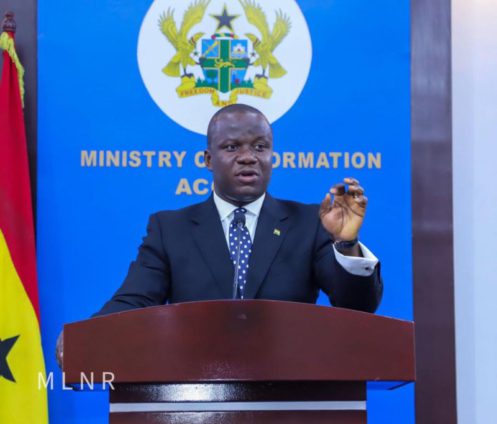Minister of Lands and Natural Resource, Samuel Abudulai Jinapor is calling for an immediate reformation of some legislations and policies on mining in Ghana.
He believes the amendment of laws regulating the mining sector would help create an enabling environment to boost the mining industry.
Speaking at the first public lecture on the mining sector by the Ghana School of Law, the Minister of Lands and Natural Resource said his ministry has initiated processes to comprehensively review the existing constitutional, legal, and policy framework of the mining sector.
Citing instances where Article 268 requires parliamentary ratification for mineral transaction, instead of prior parliamentary approval, Samuel Jinapor called for immediate amendment of this legal institution.
“The current minerals and mining policies, which was adopted in 2014, requires that it’s reviewed after every 5 years to ensure the policy direction of the mining industry responds to the changing dynamics in the industry.
“However, most of the existing laws were passed before the policy was adopted. We must also review our laws to make sure they’re in line with the policy objectives.
“This only will not lead to legislative amendments but constitutional, too,” he said.
Mr. Jinapor further called for the exploitation of other mineral sources in the country.
He noted the country’s sole dependency on gold is making it lose out on the industrial and economic benefits of the underexploited mineral resources.
He believes these mineral resources, including the recently discovered lithium, could contribute to sustainable economic developments.
“It estimated that by 2040, over 65 percent of vehicles that will be sold across the world will be electric vehicles, and the world will need close to 5,000 gW hour of lithium-ion batteries per year to power these vehicles.
“It’s also estimated the lithium industry from mining to production and assembling of these energy-friendly batteries will grow to about USD 1.1 trillion by 2035. Clearly, the country cannot continue to rely on the traditional minerals if it is to reap the full benefits of our natural resources.
“Ongoing exploration shows an initial mineral resource estimate of 14.5million tonnes of lithium oxide, containing approximately 189,000 tonnes of lithium. We therefore have to put in place the full framework for the exploitation of lithium,” he said.
The Minister also revealed the government has implemented legislative instruments to include full local content and local participation in the mining industry.
He indicated licensed mineral operators are required by the entrenched regulations to provide a localization program to facilitate training and recruitment of Ghanaians.
“The local content laws seek to ensure that Ghanaians play a critical role in the extraction of minerals for their benefits. The minerals and mining local content and local participation regulations 2020, L.I. 2431 has made a lot of key roles into ensuring true local content and local participation.
“Under these regulations, holders of mineral rights, export licences, and mine support licences are required to submit a localization programme for the recruitment and training of Ghanaians for the approval of the Minerals Commission and to submit annual reports on the program to ensure local participation.
“The law also reserves certain enterprises for Ghanaians or joint-ventures with greater Ghanaian participation,” he said.
He also charged tertiary educational institutions to develop curricula and training programmes that would provide Ghanaians with the relevant skills for their full participation in the mining industry.
“It is only when we are able to train our people to acquire the requisite skill and expertise that we can take full charge and control of the sector.
“Minerals commission can add to the procurement lease and decrease employment quotas if we can build the necessary capacities,” he said.
The first public lecture organised by the Student Representative of the Ghana School of Law was themed: “The Legal Regime of the Mining Sector in Ghana: History, Challenges and the Way forward”.
Latest Stories
-
Engr. Kwame Adu-Mante celebrates professional milestone with IET Ghana
11 minutes -
Elizabeth Amoaa’s quest to empower women, transform lives and raise voices
4 hours -
Gauff beats Sabalenka to win French Open title
4 hours -
Deputy Finance Minister urges diasporans to continue sending remittances despite cedi appreciation
4 hours -
Asante Mamponghene’s burial rites attract thousands of mourners
5 hours -
“The job was waiting for me”: MTN Ghana CFO shares journey into telecoms
5 hours -
Frema Foundation Launches ‘Dignity in Bloom’ initiative to tackle period poverty in Ashanti Region
6 hours -
Mayor of Accra calls for renewed commitment to climate action as city commemorates June 3 disaster
6 hours -
Declaration of assets: Special Prosecutor should lead call for asset publication – Dafeamekpor
6 hours -
Empower360 completes third training session for 30 young women under Ghana Grows Program
7 hours -
Sudan: A new gov’t amid escalating military-political conflicts and a deepening humanitarian crisis
7 hours -
National Vaccine Institute makes impressive strides, activate measures for drug production
7 hours -
Housing Ministry signs MoU for water exploration in Ghana
7 hours -
Tree for Life initiative takes off
8 hours -
FDA destroys counterfeit pharmaceutical products worth GH₵42m
8 hours

